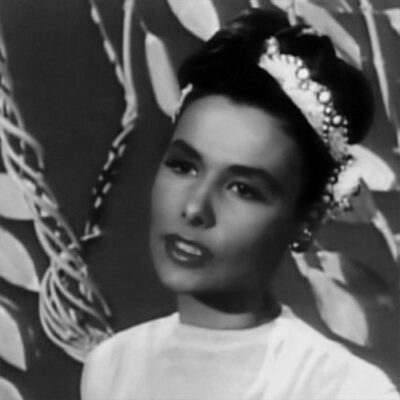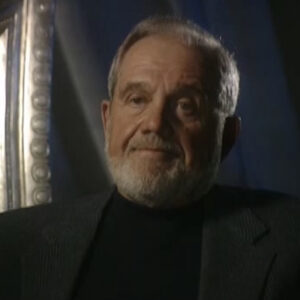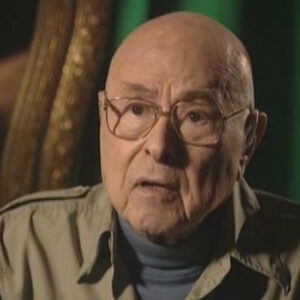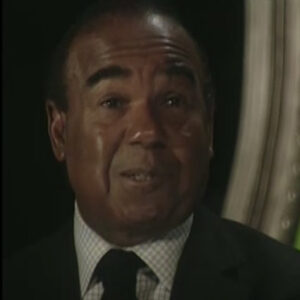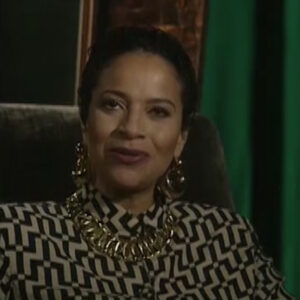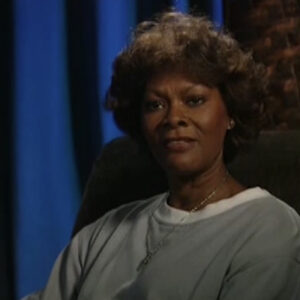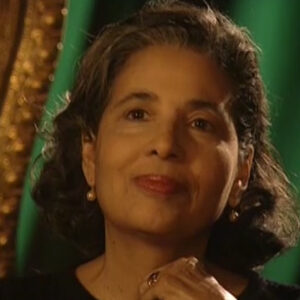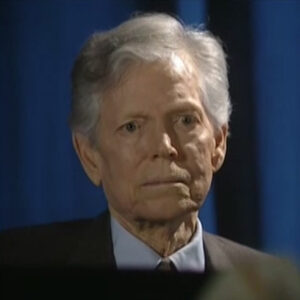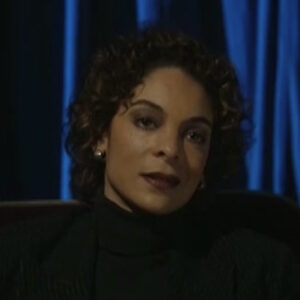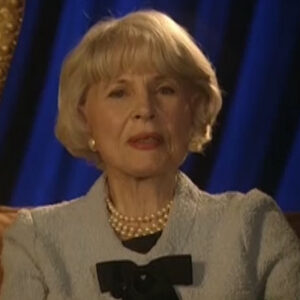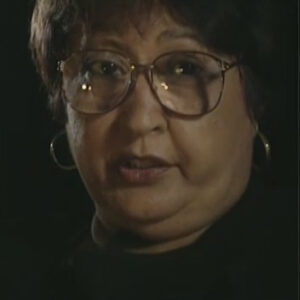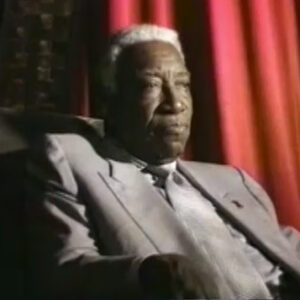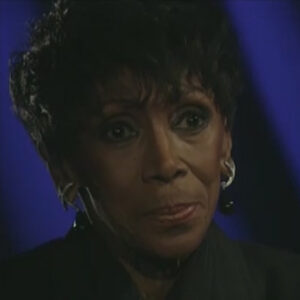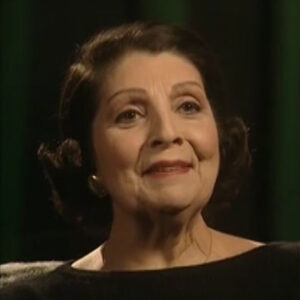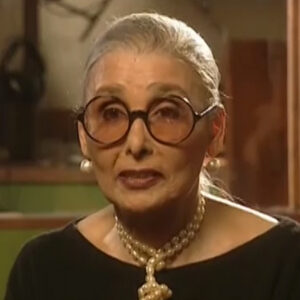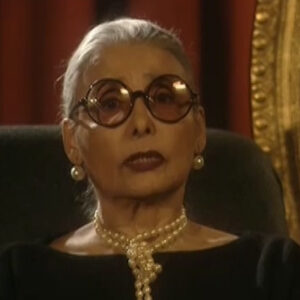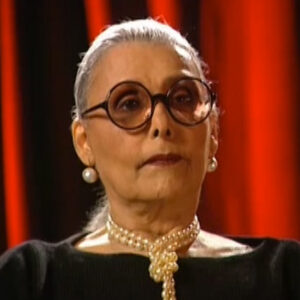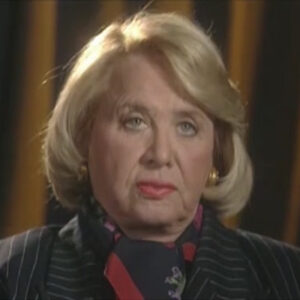Speaker Lina’s grandmother, as she was known as Cora Calhoun when she won that middle name, put him there was a very imposing woman, pretty woman, and she was what we would call today, an activist always interested in better causes for the colored people, as they named it at that time. And she Lena was back and forth at the south. I think it was what valid Georgia. And she would come and then she would be gone. And my memories are fragmented of her, although I’d say to my mother waited long ago, she went back to Fort Valley and her mother was in a theatrical company. And I think I think that was a reason for the movies and whatnot. And but her grandmother was used to talk to us about different cultural things and encourage education and different things like that. You’re a nice person.
Speaker How is she look?
Speaker Like she wasn’t a career, wasn’t a homemaker, and she was more or less out in a community for furthering the cause. Let me put it that way. And but she was very nicely in her and she taught at different things and whatever, but she wasn’t home much. And of course, her uncle Eric and her grandfather was there. And I mean, like Mrs. High was probably home in a day, but meetings were in the evenings and that was it.
Speaker You didn’t have to talk to you about what it was like when she was down.
Speaker So, you know, she had a nice disposition and she’d never complain and she just say thing, you know, where she stayed or different things like that. But she never talked about who she was with. I I knew that she was with Frank. Her uncle, Frank Franks wife was very nice when she was with different people. And actually, from what I could remember, she was with different people down there.
Speaker When she came back. Did did did there ever seem to be anything different about her?
Speaker No, she came back, I believe, when she was in the eighth grade, and that’s when I really started to remember her. And it was a years difference between our ages. And she was in the eighth grade and she was living at the haunted house on Chauncy Street. And she got along and whatever. And we were with a group of us, 14 girls, and they were very attractive. They were all black and from different they were different colors and whatnot, but they were all very attractive. And Mrs. Horne would would have us like she was interested in B’nai B’rith movement. And I remember going over to Harlem with that group and we were program girls and different things that she would try to interest us.
Speaker And I made the Baha’i. She was. She was. Yes, right. Could you say that again, please? Just Baha’i.
Speaker You would call the Baha’i Baha’i B’nai B’rith. I think at that level, whatever the Baha’i.
Speaker What was what was your girl’s group called?
Speaker We started out as Debs about town and we got old and we felt we weren’t Debs anymore, so we changed it to maids. And Matron’s may mean Mars, I’m sorry, which meant maids and Major were very bright at that time.
Speaker Why did you change the name of the club?
Speaker Because we were getting out of the, you know, vernacular or whatever, and we thought that some of the girls are getting married, they got married, some got married young. So that’s why we changed.
Speaker When you ask club members, what did you do?
Speaker Oh, we would go to the show and go to different entertainments and at the Paramount in Brooklyn, if you got there before 11 o’clock on a Saturday, you could get in for 25 cents. And we used to beat it down there to get him. And of course, all the New York shows, the bands and the good shows used to come to the Paramount. So that was one of our activities. Almost had to be satisfied to I at the program that we would go to different places they had they had our movie houses and whatnot that blacks own and whatnot, and we would go there and different things. I know as one mother that I had had a well, we we gather together on a Saturday and we would dance from two to five to all the bands, a band, the music, the band music and whatever. And I was boys and girls.
Speaker Um, and what part did Lena play in this in this group?
Speaker She was like she was a part of the group when we dance and whatnot, and she acted like the rest of us, ordinary, whatever she did.
Speaker You ever get a chance to host a club meeting?
Speaker Oh, yes. I mean, we’d have, as I said before, Tina, so we’d have it every month. And even after she went in the Cotton Club, she had only moved to the past because it was it was narrow to get to the Cotton Club and she had a meeting up there.
Speaker So you you had hope.
Speaker And yeah, there are different homes we have it was our change. You take it, you take a meeting. What was his mother like? She was good. You just I mean, as a mother, his mother was a very pretty woman, short, rather stocky and very nice.
Speaker And I think she treated me.
Speaker She she treated Lena. Nice, lovely.
Speaker However, I Lena, let me put it this way.
Speaker Lena was adored her mother, and she felt that her mother had done everything for her and she just thought that her mother was the greatest. And so when she was what was the third year of high school, she’s finishing now at Girls High and a mother arranged for her to go in the Cotton Club. Oh, Lena was always gung ho on education and I was finishing high school. And so when she asked me what I was doing, you know, till I was going, oh, my God, I’m afraid of it, my education. And there were tears in her eyes and she said, Oh, I wish I could go to school. But her mother said that she should go in the Cotton Club. And then, of course, she was she was making, I think, forty five hours a week at the Kangnam at that time.
Speaker That was a big salary. And and she turned around and she gave everything to a month ago. So it’s paid once a week. So I even said giving her the whole salary, she said, oh my mother, this, that and the other. And she had a stepfather was very nice. And they neither one of them were working. So they continue to do that then.
Speaker And they were being so adoring of her mother, she just thought she was the greatest.
Speaker Did you did you see? I was a bit yes.
Speaker But you know, when when a grandmother died and her mother arranged for this stay with this, Mrs Frolich, that Laura Frolick and Mrs Frolich was in the Urban League and gave these amateur shows. And we she from the Junior Theatre Guild and we put it they put on this play and we were all in it and it was boys and girls. And Lena was a star and they had a nice little storyline. And I remember her singing the two songs was Stormy Weather and Got the World on a String. All right, then. And and Nina was living at Mrs Radack’s until her mother came to New York, a Birkin, and she went in a cotton club. However, this is. I guess it’s old enough that, you know, he was making a mistake and this, that and the other, a lot of people are silly or whatever thought he was go in a den of iniquity. But anyhow, she resented what highly Mrs. Frolich said. So one of those things but I realized at the time that her mother was using what she did and I didn’t say anything, but it was until later on that somebody convinced her what her mother was doing and this shortly before she married.
Speaker How it happen? I think it was her first husband and she had pointed out certain things and she had to realize it. So then she she loves you. Once you got married, she went to Pittsburgh and we just got back.
Speaker Yes. Could you just tell me, in terms of Mrs. Rocklike disapproving of Lena going to the Cotton Club, what what was Leena’s what did I say?
Speaker Well, she was afraid of I, I don’t I wasn’t there. But she pointed out to her the full racist. If I go to the Cotton Club and all the things that happened in the theater and different things and a lack of I’m not continue her education, which Lena really wanted to do and Lena resented because she was so crazy about her mother.
Speaker So Lena wanted to stay in school. That’s right.
Speaker But her mother convinced her about the stage and say, I’m against her mother was stage Dragoslav and she was living trying to lead herself and Lena’s life. I don’t know what the reason was.
Speaker Now, among among your set, when Lena started playing in the Cotton Club, were there murmurings?
Speaker About that. Yes, I mean, as I said, I mean shock, you know, you weren’t supposed to do that. And in our group and of course, they.
Speaker Are some girls you have group with 14 girls you like some better than you do the others and some of the girls that you saw a lot of, it’s one of those things. Don’t call me, I’ll call you. And it never happened.
Speaker And I was always with.
Speaker You know, I would eventually went to the Cotton Club that first time he was rehearsing all that summer because it was in June that she went and all that summer, she is hurting for the whole show, for the fall show. And I was, you know, to go down a house and she’d come up to my house and my brother was there. He was older, but his crowd would be there and we would be in the backyard when I went to and I mean, iced tea and cookies or sandwiches or whatever. And we would go find places because she was off on Sunday then then she went in the Cotton Club. But there was a difference with some of the girls.
Speaker Did we never tell you what it was like at the club performing there?
Speaker Oh, yeah, she told me, you know, it was strange the world to her and how the lights were on. She was a showgirl and the rest of like a little girls and she would talk about it right now. But she never complained.
Speaker Was it at all, was the Cotton Club exciting to her?
Speaker I guess so, it was such a different world, but he never fraternize with the people that are bad. She was nice to him and she’s friendly with him, but she never fraternize with the.
Speaker And her mother wasn’t with her mother always there. Yes, she was a Stagedoor mother.
Speaker Um, did not tell you anything about what it felt like when she first got to solo or do a do her duet at the Concord.
Speaker I don’t think she got to do it at the Cotton Club, I think she lost the cotton town with with no Cecil, I believe I don’t remember now.
Speaker I think that was right when she thought she did. Yes. She was a singer in his orchestra. And what was Noble Cecile’s reputation at the time? Well, he was blessed with his name. Yeah, he was quite a badly noble.
Speaker Says he was noble, says it was a you know, whatever renowned bandleader, Orchester was good and whatnot, and it was a step up for Lena.
Speaker Well, when you went to visit her in Pittsburgh after she got married. Mm hmm. What was Lewis Jones like?
Speaker No, he was nice to me and nice to the three of us. And they were very nice and they entertained us.
Speaker And another thing, her father is the first time Lena got to know her father when she went to Pittsburgh. And I guess her mother had talked about him and whatnot, and she really didn’t know him.
Speaker She found out he wasn’t aware that her mother had led her to believe or whatever, and they were the entertainers.
Speaker We used to go to fights, which we didn’t appreciate, but they thought that was great and they were into sports, baseball and whatever. And they had a club that was really a lovely building and whatnot. And they took us there and they were very nice to us on every day.
Speaker Well, now, that was a matron in the. Did you get a sense or did she tell you how she felt about this new life she was living?
Speaker Well, that was the she was a had newly married. She was pregnant with a girl and she was happy then.
Speaker There’s a picture, isn’t there? Yeah. Could you tell us how you got into the Pittsburgh area?
Speaker Well, they know. They know. They they know like a father and whatnot.
Speaker They were all well known in Pittsburgh. And I knew the editor and they took our pictures and put it on faith.
Speaker When his father what kind of reputation did he have along your your set in Brooklyn?
Speaker Oh, he was well known. I mean, I just need you to save me a spot. Lina’s father was well known. I mean, all the horns were well known.
Speaker And but, of course, I don’t know when he went to Pittsburgh. I imagine it was in the early years or whatever, and he married his mother and whatnot. I don’t even know when they split up. But he was well known and charming man and good looking. Handsome and charming, very charming. That’s why I knew him when I went to Pittsburgh and he did everything to make us feel at home. And of course, I think Nina got to know her father and loved him when she went to Pittsburgh.
Speaker Was there a point at which, um, some of the girls change their mind about Lina and brought her back into the fold?
Speaker Oh, she never got out. They never she never got out of the club. She was always in the club. It’s just that they sort of ignored or didn’t, you know, wouldn’t answer the phone or things like that. But she never got out of the car.
Speaker That she stayed there until she married.
Speaker How did that make her feel for them to do?
Speaker She was hurt. Come on. I mean, she was very hurt. I mean, you think that people are your friends and whatnot, and then you find out that whatever at 16 is hurt.
Speaker Did you ever let me ask you this, how did you feel when you found she was going to the Cotton Club and couldn’t you go to school?
Speaker Well, I mean, I just accepted it. I mean, this is where your mother was, what you wanted and Lina was willing to go. And it was it I mean, I didn’t look at it with any horror or anything like that. I mean, I knew that she would do what her mother said, and I really didn’t think that much of it.
Speaker How different was. Lena’s experience to the rest of your career?
Speaker Oh, quite equal. She went to the jack and cheese. I mean, were a little Groupon living a normal life? And wherever she goes in the Cotton Club and sees all kinds of things and all that was allegedly said, it was run by the mob, we couldn’t go up there because we were black, a color, whatever you want to say. And we knew that. And it was just a different world for her.
Speaker When I.
Speaker When when did you ever go to see her at the Cafe Society once, could you tell me about that? What were the first what was the Cafe Society?
Speaker There were two. There was one downtown and was one up there and I went downtown.
Speaker OK, I just need you to put the name Cafe.
Speaker I went to Cafe Society. There were two cafe societies, one uptown and one downtown. And I think she started in the downtown one and uptown one I think was a little classier than that.
Speaker And I went once and she was a featured singer, which she had. That’s when she began to get noticed. And whatever.
Speaker What was her performance like?
Speaker Very good. I always enjoyed her singing and whatever. And of course, when we were young, she was always singing.
Speaker She was I mean, you’re seeing this strange thing that she would say so when she was when she was growing up, she always had a sort of theatrical bent is.
Speaker Yes. I mean, she had that I don’t know what she had, but she had a nice voice. And we would tell her this thing. She would sing.
Speaker And this is what she tried to encourage her to go, but she tried to discourage her going from going into the Concord.
Speaker And talked against the mother and sisters where they didn’t get her.
Speaker But during the time that Lena lived with Mrs. Warlick. What was their relationship like?
Speaker He’s very nice to it. OK, I just need you to say Mrs. Wallach was very nice to Lina and she she had more order with her than she did with her grandmother.
Speaker I mean, she was a homemaker, which Mrs. Horne was not. And she was very nice. And they had they had a good relationship.
Speaker How would you describe Lena’s childhood?
Speaker Sad because she was a Leanna’s child to me, was sad because she was in Brooklyn and then just like she was in an ethical culture and I will tell you how that happened.
Speaker My mother was on the board of the colored YWCA, and at that time there were white women on the board. So they had asked my mother if they were way ahead of their time. And I had asked my mother if she would send me there and that they would provide a full scholarship. But I had an older brother and sister. My brother was going to junior high and my sister sisters in high school and my mother didn’t want to make a difference in our education. However, she knew Mrs. Horne and she called her and Lena went there for a year and they were wanting to carry on to the eighth grade, you know, but Mrs. Horn came and my mother came up and got her and put it took her daughter.
Speaker So that’s.
Speaker Ah, so this is she was here. And if she came maybe on a summer, either my sister would take me out to see Lena or her Uncle Frank would bring her over to my house.
Speaker And this is what it was. That’s why my memory’s fragmented of Lena, though. I remember her, but I don’t me just play together.
Speaker We talked on the phone. He said something that really struck me. I love you to be able to say it again. That just one moment someone just came in. What is going on?
Speaker You said that she didn’t seem to belong to anybody.
Speaker Well, that’s right. Could you could you just say, well, the reason is because she was you prison, because nobody’s ever going to hear what I say. OK, you want me to repeat what you said? Yeah. Which is actually repeating what you said. Lina didn’t seem to belong to anybody because even when she was down south, her mother had her in various homes.
Speaker And as I look back now, she was she would come up to work and we’d play. And then all of a sudden I said, well, then she went down south and she went with her mother and her mother was a theatrical company, whatever. But when she went down south, the mother didn’t live with her and she lived in various homes. So that’s why I feel that it was a sad life. I mean, you know, all of us had parents and lived in a home and steady and very steady. Lena’s home with fragmented.
Speaker And even when she was in Brooklyn, it was not all that stable.
Speaker No. Well, I mean, like she was with her grandmother and then she died and the mother arranged for her to go with Mrs. Vocativ, who employed with Mrs. Riley. And that was a guess about two and a half years. So all along was this that Nehad?
Speaker What about his grandfather?
Speaker What was it? I don’t hardly remember him, very nice man, and he would be nice to us, but he would go upstairs or whatever, but I hardly remember him.
Speaker I was trying to think the other day, but I remember two old man.
Speaker Nice looking back, a very pleasant but other than that, I don’t remember why. Why were the horns so well known?
Speaker Well, in Brooklyn, all of the blacks stayed together and they all knew each other. And although it was the depression and whatever, and they weren’t on the poverty level, but they weren’t wealthy either. And most of them had their own homes. That group had their own homes. And when I was working hard for a living, they had various jobs. A lot of them were in the in the government like post office and things like that. A lot of them had bank jobs and whatnot, but they all know each other, just like her mother’s family, Skytrain, they were well known to them. So everybody knew each other. Working was a small town as far as blacks were concerned, and everybody seemed to know each other.
Speaker That was I mean, that was a particular group of people, I mean, the black middle class was not all that large at that. That’s right. But it was very conservative. Could you just tell me a little bit about what the black middle class in Brooklyn was like?
Speaker Well, I mean, like they had interest in the NAACP and Urban League and different things like that, and the churches certainly were an influence on their crowd and they were working for a better a better life for the black people.
Speaker And they taught us that we should always help the ones that are less fortunate than we are right now in.
Speaker This is what but they they had their parties and they were among themselves and they to bridge and different things like that, but they stayed among themselves, but they were very interested in their children. And it’s like I said, Lina’s mother’s family was scattered. Scotland, they were well, no family in Brooklyn and a lot of well, no families, but they sort of stuck together.
Speaker Could you tell me about how you got the name Salvations now?
Speaker Are we as a kids? We had a slam book and they would put your name at the top, say, Ruth Johnson, Lena Horne forever. And they would write down, you know, different things about they weren’t too hard right now. But Lena, when she went to the to the meeting of the what did you call it, the Bahai, which we call Vanessa Respin, whatever. Anyway, when she went to those meetings, she picked up your child and she picked up their theories and won and she’d come back and she’d tell us about it. So then they got to put down an Islamic salvation. So, you know, so different things like that. And she’d feel about that. She didn’t have nothing to hide it, rethink. They have there we go at each other’s house and somebody would have a slam book or see what they put in this week about us. We raised more or less, took it as a joke, and it wasn’t anything to Erfle any.
Speaker Um, she, uh.
Speaker Let me add before we move out of this time for the couple things that you said, I just want to get, um, you had said to me that she was a child torn between her mother and her father. Could you.
Speaker Yes, she could. Tell me that and tell me why later.
Speaker I know. I guess that they know they were quarreling and whatnot. And from what I heard, anything that Teddy, let me put it that way, Teddy said to her mother, was signed into cash, if you could. And then, of course, as some couples do, she talked against Teddy and Lina, think that she was the only one in her life and like that.
Speaker So therefore, she didn’t know her father until she went to Pittsburgh. So that’s why I said she was torn between the two and she felt that her father didn’t love her, but he did. But he couldn’t put up with the mother’s treatment.
Speaker And even in Brooklyn, one of the things you had said was that she was a child that no one knew what to do with.
Speaker Yes, because I say that later as a child that nobody knew what to do with because she just she just what is this terrible intellectual sadness that any other and they really didn’t know.
Speaker I mean, I’m like her grandmother, who certainly took care of a lot of things, but left her alone on her own as far as domestic things were concerned.
Speaker And then with the mother being so overprotected ever, uh, she was more or less left alone. I mean, she lived with many different people, even down south. She wasn’t always at one person’s house. And that was it. That’s what I said, that she was a child that nobody knew what to do with.
Speaker Now, what do you know about Lima and Joe? Oh, Joe Lewis.
Speaker She went around with him for what was his name? She went around with Joe Lewis for a while, wasn’t alone. He was, of course, he was less than any other, but maybe six months.
Speaker Was there anything to do? You know, what was said about her?
Speaker No. At that point, they may be, you know, a total date or whatnot, but they didn’t think too much of their.
Speaker Um, you had told me that at one point came over because a dance had been given and then.
Speaker Oh, yes. Could you tell me about that? Yes, I think she was with Noble Sister Lena. Lena was with no sister. And course they had engaged, was out of town and the other. So she was free. And we were given a dance for some charity, like the memos were given the day.
Speaker So I called her and asked to which he come over to the dance and she came over and she sang and won and she made the dance. Was she treated by the other day, treated her right? It was just that the hurtful part came when she was 16 and went into the club and went into the Cotton Club. And when she tried to reach certain girls, they they snapped. That was when the hyper. But she sort of got over that. You really never get over that. But anyhow, she got over that and accepted the group, and that was it.
Speaker Did you go to see her in Jamaica? Oh, yes.
Speaker Oh, yes, I went to see her and then I belong to a group called the Jack and Jill, and they were mothers who were trying to find the strength of the various things of interest for their children. We would take them various places. So they had water, a block of tickets for Jamaica for these children. They were about 12. And so that the chairman of the group called me and asked me if the children could go backstage. So I got in touch with Lena and I asked her and she said, oh, yeah, when I was there, she told me what to do with my father. So so after the show, the children all went backstage.
Speaker They were about 12 and Lena was trying to talk them this night. In the meantime, there’s they’re so awed by being backstage and they’re looking all over. And this was a matinee and they were getting ready for the evening performance. So they were just they just awed the whole thing. And Lina felt that she didn’t do it. And I said, no. I said they’re just kids and they’ve never been backstage. And you just, you know, really don’t realize how they are. But she was very gracious to.
Speaker Now, Lena was born in Brooklyn, yes, spent time there. Did she so much was.
Speaker Oh, no. I mean, even though I mean, she got a very distinctive voice and I still, you know, hear that Southern accent, I well, I guess when you’re young, you inform it that way.
Speaker And he but she was born in Brooklyn.
Speaker But whether she was here when she was three or four, I don’t know. I tell you, she went to the country, but that was only a year, so you more or less pick up the vernacular where you live.
Speaker Um, oh, you were telling me about this fundraiser and Lenny thing, you know how. She would tell the Muslims, how could you tell me about that?
Speaker Yeah, well, because she would she was with her grandmother and we were maybe went somewhere out of nowhere.
Speaker And I’d say to her, oh, she say, my grandma left me a quarter for dinner. I get ice cream. Said I said, come on over to my house. Now, she wouldn’t come to see that. I mean, and this happened frequently. So Grandma would give a quarter now then you could get a good ham sandwich for a dime. But she gets preferred soda and this is the way she ate. So when I when we were with landed at a restaurant and at seven she did. And I said, oh, so she said, yes, she knows how I you know, when I was.
Speaker And that was just so, yeah, that’s a kid, so.
Speaker Now, you said something about Frank, could you describe who Frank was, Frank with their uncle Frank?
Speaker Frank Hyde and I don’t know really too much about him. It’s more defined in his book. And I know Berg better than I know Frank. I just sort of. But he was in the government, in government, pretty high in government. But I really don’t know what job he will remember, what job he had.
Speaker Special relationship.
Speaker Yeah, because Mike was always there when Lena was there. I mean, he never married her really long after Linda left. And he was always there for Leanna. He was charming and very was charming, I mean, all the horns had charming smiles and they were all charming and he finished, uh, pharmacy school in Brooklyn. And, uh, but, of course, those days he couldn’t get a job as a pharmacist. And so he never worked at it. But he was very gracious and he was a lot of fun.
Speaker What did you see in the music? Oh, yes. Could you tell me what you feeling?
Speaker Oh, I was I was thrilled. I mean, she is the title of this lady and her music. I was thrilled about that. I mean, it was just fabulous. I mean, just wonderful.
Speaker Did you know when you saw it? Did you know that she had gone through a. But I don’t see the way the music is the first time that they put out in public what her life has been like.
Speaker Oh, yes, yes, yes. Had you known about that? Yes.
Speaker In fact, I don’t know, ladies.
Speaker Mother, of course, when Lina found out, I was told about her mother would never realize what a mother was doing.
Speaker She sort of just let everything go. I guess she was just terribly, terribly hurt. And I don’t know whether I know she didn’t bother with her mother, but I heard she didn’t tell me. Lina didn’t tell me. But I heard along the way that her mother had written to Walter Winchell, of all people.
Speaker And, you know, everybody knows Walter Winchell’s, uh, what he was all about, saying that he didn’t have any money. And she, uh, she was Horne mother. And I said, yeah, well, I heard that along the way.
Speaker So I saw Lena shortly after that. So I said to him, did your mother really write to Walter Winchell? And she said, Oh, yeah. She said, but they told me that I had to support her. And because I couldn’t stand them, bad publicity, I said, well, they’re right. And I said, no matter what, she’s still your mother. So from then on in, she supported her mother and then she, you know, have her you know, she went round and she if I was anywhere where Lena was, she never complimented Lena. She’d always tell Lena, you’re so pretty. That’s what you tell. She never said anything about her performance in Jamaica. Of course, she was dead by the time the lady in the music. But anything that Lena did, she would just say, oh, you’re so pretty.
Speaker Could you just say that? We might say that again, which I think her mother never complimented.
Speaker Linda’s mother never complimented her, except to say that she was so pretty.
Speaker I’m sorry, I just need you to go back the whole thing to say the whole thing.
Speaker OK, Lena’s mother would be if I went anywhere backstage or whatever, and I’d see her there when she’s always very gracious. And I would hear her say, oh, I guess so. Pretty. She never complimented Lena on Jamaica or any of her music ability or anything. It was just that she was oh, guess so pretty.
Speaker Did you get did you feel good? Do you think that Lena’s mother loved.
Speaker Yes, but she was a stage mother to her ambition to foster her own feelings into Lena. I felt that it’s sort of like maybe she would have been, you know, she wanted to go to college. She didn’t. And why not? She’s well-read and whatever. But there’s certain things that her mother forced her into and and then bringing her up to think that she’s a wonderful, most wonderful person in the world. And to have that great shock at 19, it was hard.
Speaker What do you think? How do you feel you must come through all of this?
Speaker I remember I think Lane has come through it most admirably because he’s had a whole lot of knockdowns and, you know, she is where she is today. She certainly deserves to be there. But she’s had a lot to contend with and she’s been very stoic through it all.
Speaker Oh, one other question, just in terms of how you would describe the, um, what did you feel before that you were the man more depth about years that all of you are good looking? Yeah. Um, did you have any kind of special reputation for being pretty or was she just another one of the people she was aware of, the other group that we all attractive?
Speaker She was one of the most attractive. I thought we were all different colors and sizes and whatever. She was one of the most attractive.
Speaker So did but she never she would never was conceited or anything like that.
Speaker So did the boys try to.
Speaker Oh yeah, they liked it. Oh, yes. Yeah. I mean, she was attractive. She had a personality and everything else, but she never liked boys. I mean, I never saw her like we would get crushes. Lina never had crushes. Why do you think that? I don’t know, but I remember she she liked this one like the other one to go out with them, but it just didn’t faze her.
Speaker Do you think it could have anything to do with that father?
Speaker She didn’t know her father that time. I mean, for a long time she didn’t know if. I mean, I think that I mean, her quest for love. And. Has covered her whole life, and until she met Lenny, she really didn’t meet Mehterlam.
Speaker What did what was from your observation, what was it like this morning?
Speaker He was he was well, he was in love with each other, definitely, and of course, he Lanni was in love with her and she was in love with Lenny. And I saw that. And he thanked me for the career and he was very protective and things that she had never had before Lenny provided.
Speaker Do you remember the health insurance?
Speaker Yes, that was very well, it was a two story, what they call to, would you say the house? The the house on Chauncy Street was a two storey basement house that they called the story.
Speaker It had a dining room and a kitchen in the back. Then on the next floor, it had a a holiday used to call it sometimes a back parlor, sometimes because people used the four bedroom. And then on the top floor that was used be a front room and a whole room. And then in the back there was a back room, sometimes the whole room, sometimes baths, and sometimes bathroom was in the middle. Now, at that time, there were very few blacks in Brooklyn. And like with Lena, she her mother, grandmother, she had the house and my my cousin, who married a Baptist minister, she had the house next door, but they were the only two blacks on the block now.
Speaker And in the various houses that the girls lived in, maybe you two or three on the block. And and it was was an arrest of white people. So this was the way it was. And and I guess that’s what made us sort of get together, whatever. And the House have been very nice. Very well kept. They remember what it was like inside, I mean it in terms of their core, yeah, it was very clear, but they all had they all had the decor was great. I mean, they had lovely sofas. And I can’t think of the names now. And it was they always had China the most China and silverware well appointed.
Speaker What for you, what was it like growing up in Brooklyn?
Speaker Oh, we enjoyed it, we had a good time and I mean, like the junior theater, we had, you know, rehearsals and with this other, uh, girl, the mother had a dance on Saturdays. And when we were young and we the boys and girls all together, we had a good time. And we we just didn’t race didn’t come into it.
Speaker Do you feel you protected from racism from those issues?
Speaker No, I mean, whatever issues came up we know were color, black, whatever you say. We knew that, but we were told, don’t worry about it. I mean, do well say my I do twice as good as a white man and you get ahead and this is what we were told. Get your education.
Speaker Now, when I went to school, I went to school in Bushwick section. I graduated about 350 people and five of us were black. Well, of the five, three of us went to college of the of the white group, I would say maybe 50 went to college. The rest will finish high school. They were smart, whatever. But there they were going into the telephone company, the gas company, whatever companies, and they could get a job. We knew we couldn’t get jobs, so we had to get our education. And that’s what we were taught. And we were just taught not to be proud. We were planning a college, as I said then, and not worry about what the white man said. Do you see them now? No. Well, you know, all eyes are entirely different and I’m in Brooklyn and the way this place is, you don’t travel too me reenacting.
Speaker All right, well, let me just ask, have you seen have you. Have you had a chance to see Lena’s great grandson?
Speaker I mean, my grandchildren know I met her, I met one of her grandchildren.
Speaker She was down in East Hampton, Long Island, and somebody had called me and told me she was there. So I went by there and I met one of her grandchildren. That was Gail’s daughter. I haven’t seen the other two. I didn’t meet her son, but I haven’t seen the others now. And I know she has another child named. I mean, she told me that she looked like her, but her mother was a Jehovah’s Witness. And, of course, they have different ideas that we do.
Speaker What was the father? Oh, I’m sorry, son.
Speaker Well, that’s who I also am when I was young and then I met him at 16. He was very bright. And she told me earlier and told me that he couldn’t pull apart a pull a car to pull a car out and put it back together. And he he was bright.
Speaker However, he was raised by his father and there was a mother did to her, as father did to Lena.
Speaker And so there wasn’t too much of a rapport there. And although she tried different things or whatever, I mean, she would see him. But I made an error because he looks so much like his grandfather, Terry, that I made the error of introducing him very hard. What did I do that for? He highly resented that his name was Joan. I said, all right, all right. But this is where he would never express to you felt.
Speaker Oh, yes, I’m actually very worried about it and whatever did you just say she’s Lina was very worried about not being able to see a little teddy, you know, and as often as you want or whatever. And Louis, her husband, was very adamant about that. And she told me at one time that he wouldn’t allow her to send the president over five dollars to him.
Speaker Yes, I mentioned if she on the stage and she didn’t want him to be staged just because his mother was a star, that is this was my feeling.
Speaker Now, do you remember Lena Horne day in Brooklyn?
Speaker They didn’t tell me, but yes, I heard about it. I didn’t know anything about it, believe me.
Speaker And they knew I knew it well. But they did not tell me that. No, I wasn’t even there.
Speaker And it was a lot of people who didn’t know. And she was surprised herself.
Speaker OK, could you just tell me what is you’re referring to one about the other.
Speaker Lena Horne day in Brooklyn. Now, they never told me about it. I didn’t know about it until it was over. And I think that Lena was surprised herself because there was very few people in Brooklyn that she knew was at the affair.
Speaker The one thing I when we first started talking, I need to just get this a little bit clearer and make sure if we could just.
Speaker Tell me about your clothes. Tell me about the, uh, the first name you had that you used to get together every Saturday, every month, every month, and then what you changed the name to.
Speaker If you could just give me that in the full sentence, I’d appreciate.
Speaker Well, we started off as Dabbs about and you just say, like our clothes, our club started off as steps about and we were about. From 11 to 18 when we started.
Speaker But as we got older and we realized that one girl married very early, age 16, so we realized that we couldn’t call ourselves any longer. So we coined the name and Matron’s and made it may me more.
Speaker And that was what our club was called.
Speaker Oh, OK, and I just need you to say, and Lehman was part of.
Speaker Of Alino is part of the group, and she stayed in the group until she got married and went to Pittsburgh.
Speaker Less than when he started talking about the Pittsburgh. You kept referring to Dana, and I just need you to.
Speaker Well, I’m trying to remember the names of the men who were very nice to us. It was a group I care. They had a club there, too. There is where they had a club in Pittsburgh. And it was a big imposing building, very nice building. And the men of the town would get together, I guess, every month and have meetings and whatever and.
Speaker Well, I mean, I don’t remember the names I remember custody on, but I can remember the names of the men and entertainers that some were lawyers, doctors, Indian chiefs, whatever it was, a group of men. It was well thought in Pittsburgh.

